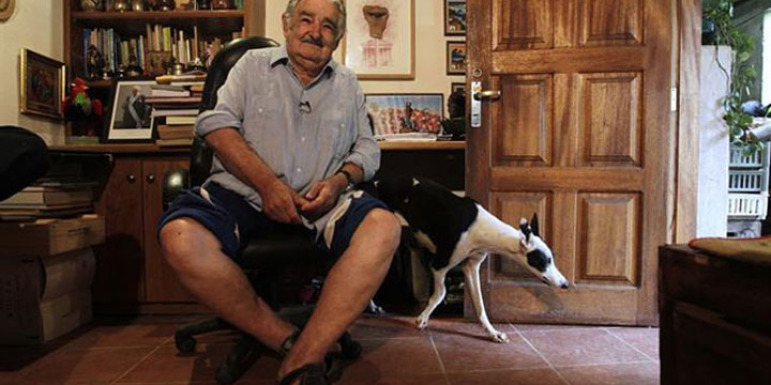
Mujica: ‘Those who love money too much should be run out of politics’
Uruguay’s departing president defines himself as ‘the world’s poorest president’ and recommends that politicians must ‘live like the majority of the people.’ He says the search for collective happiness must be the core of any policy.
Uruguayan President José Mujica defends his “sober” lifestyle and his way of viewing politics as “the struggle for everyone’s happiness,” so he has come to the conclusion that “those who love money too much should be run out of politics.”
This Sunday [Oct. 26], Uruguay will hold presidential elections in which the ruling coalition, the Broad Front, has an advantage (according to polls) but not enough to prevent a runoff between its candidate, Tabaré Vásquez, and the candidate of the National Party, Luis Lacalle Pou.
“I’m not poor. I am sober-minded, carry little baggage, and live modestly enough so that things don’t hamper my freedom,” said Mujica in an interview with CNN en Español.
He has been called “the world’s poorest president.” In his opinion, “we presidents have to live the way the majority — not the minority — lives.”
For that reason, Mujica, who will step down next March because he cannot be re-elected, maintains that “those who like money too much have to be run out of politics” because “they’re a danger.”
To the former guerrilla, “politics is the struggle for everyone’s happiness,” although he believes that the existing republics “went off-track a long time ago.”
“The republics came to the world to say ‘no’ to the monarchies and the bloodline meritocracies and to state that we men are basically equal […] but if others deviate from the essence of republicanism, that’s not my fault.”
Mujica laments that the aides “surrounding the presidents resemble the ancient courtiers” and insists that “the president is a functionary elected by the people for a moment and a time frame,” but “nobody is greater than anybody else.”
Defense of life
On another subject, he says that “our religion must be the defense of life. We have to fight and defend this life” and also “be happy.”
“If you have money, you can’t go to a supermarket and say ‘Sell me five more years of life.’ You can’t do that. It is not a merchandise. So, you mustn’t waste it. You have to try to use it and spend it on the things that motivate us to live.”
Although he is reluctant to take stock of his five years in power, he points out that today there are “fewer poor people, fewer indigent people. Poverty is down to 11 percent, indigence to 0.5 percent. Ten years ago, the poverty rate was 38 [percent]. Things have improved substantially.”
The president, who was in prison during the years of dictatorship, regrets that “we still don’t have the truth” about that period of time and “because truth was missing, justice was not done. Far as I’m concerned, even if I learned the truth, I would not impose punishment, but that’s not what the majority of society thinks. They want punishment.”
He believes that “learning the truth is punishment enough, strong punishment. To me, the proper way was [Nelson] Mandela’s. If people admit responsibility for their wrongs, that’s it; I won’t punish them. But they have to admit responsibility publicly. And that’s the punishment,” he says, referring to the end of apartheid in South Africa.
(From the: Publico)

